Archive for March 19th, 2010
CIG still needs new revenue
(CNS): Colin Roberts, the FCO’s Director of the Overseas Territories (left), has told the Cayman Islands Government that the UK would still like to see it come up with new revenue raising measures in order to balance the budget. In a letter to Premier McKeeva Bush, written at the end of last week’s UK talks, Roberts says there is still a need to diversify the revenue base. The senior UK civil servant states that the UK Minister (Chris Bryant) would be “surprised if new measures are not brought forward” as part of the proposed three year plan.
In his letter Roberts indicates that the UK believes the development of that strategic plan must include careful consideration of new revenue-raising measures in addition to a reduction in public spending, “both to stabilise the revenue base of the Cayman Islands Government and to present a more positive image as a financial centre,” he wrote.
The poor performance of revenues relative to forecast, he said, have reinforced the case to diversify the revenue base and improve forecasting performance for the years to come. “It is disappointing that the Miller commission did not provide a robust, quantified assessment of such measures,” Roberts stated in the correspondence, referring to the independent report commissioned by the Cayman Islands Government to examine the country’s finances and present solutions to balance the budget.
He reminded the premier that the plan toeliminate the CIG deficit by 2013 should include credible and deliverable measures to restore balance, and while he acknowledges the “stark … assessment of public finances”, with which the UK agrees, he urges the premier to take action, despite any resistance. Roberts warns the premier that asset sales and private finance initiatives need to be accompanied by a robust business case and financial appraisal to ensure that best value is secured.
“Such initiatives, if not carefully handled, risk becoming a long-term liability to the Cayman Islands, further increasing the gap between operating revenues and expenditure, and further reducing flexibility over expenditure in future years,” Roberts wrote.
The FCO representative said the UK would be happy to discuss borrowing requirements once they were satisfied there was a credible and deliverable plan to balance public finances within the next three years. Roberts also confirms the FCO will support the premier as he prepares and implements the measures necessary to start the recovery. A draft of the three year budget is to besubmitted to the FCO by the end of March, the letter revealed.
“My economic team will visit Cayman in the week of 22 March to conduct the economic review and to help to with process,” Roberts added.
Meanwhile, a release from the governor’s office on Friday afternoon also sought to clarify the visit of the economics team, as mentioned by Roberts, to the Cayman Islands to review government finances and discuss the three-year plan. The UK experts will not be writing the plan but Roberts noted in his letter they would “help with the process”.
Andrew Paterson, the newly appointed Economic Advisor at the Foreign and Commonwealth Office (FCO), and Carole Pretorius from Oxford Policy Management, an independent consultancy, will arrive on Monday to undertake a review of the economic situation and public finances, the Governor’s Office said.
As in previous years, the aim of this visit is to meet key stakeholders in the Cayman Islands to deepen the FCO’s understanding of the challenges faced and to consider what is needed to promote financial and economic stability over the longer term, the office stated. “Paterson will be interested to examine the Cayman Islands Government’s performance in relation to the existing borrowing guidelines for OTs, compliance with the conditions attached to additional borrowing this financial year, and medium term plans for public finances,” it was stated.
The office confirmed that the team will take the opportunity to discuss how things are shaping up with the draft three-year plan to deliver sustainable public finances, though the plan will be developed domestically, with neither Paterson nor Pretorius involved in its drafting.
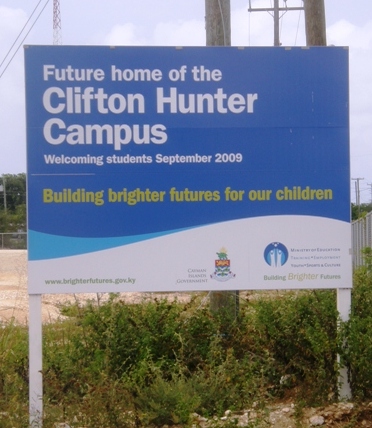
Contractors unite on schools
 (CNS): Some of the biggest names in the Cayman Islands construction industry have come together in order to submit a joint bid to complete the two troubled high school projects. Cayman Construction Management Limited (CCML), a consortium of local contractors and construction management firms, experience and expertise, has submitted a bid today, Friday March 19, in response to the government’s invitation, issued last month, for tenders for construction management services to complete the two schools.
(CNS): Some of the biggest names in the Cayman Islands construction industry have come together in order to submit a joint bid to complete the two troubled high school projects. Cayman Construction Management Limited (CCML), a consortium of local contractors and construction management firms, experience and expertise, has submitted a bid today, Friday March 19, in response to the government’s invitation, issued last month, for tenders for construction management services to complete the two schools.
Arch & Godfrey, McAlpine,Hadsphaltic and DECCO say they have created CCML as a joint venture for the sole purpose of submitting this single bid to provide services for the completion of the Clifton Hunter and John Gray High Schools after Tom Jones International walked off the sites in November last year due to a dispute with government.
“The two high school projects require a construction management firm to take over the project in mid-cycle, at a peak of activity when the highest level of resources are required, and without the time usually afforded for a gradual build up of the management team,” CCML said in a statement. The firm said that by coming together to form this one-time single endeavour, CCML will be able to move quickly to take the project forward. The firm stated that each of the partner firms can leverage its existing experience and expertise, minimizing the need to import construction managers from overseas who would require a much steeper learning curve than a local firm.
“CCML is an innovative approach to a complex, challenging construction project. As a local organization made up of Caymanian companies, our comprehensive solution will provide the best value to the Government. We also feel a great sense of pride and national accountability to ensure these two schools are completed to a high standard and to serve the best interest of the country,” said Heber Arch of Arch & Godfrey.
The partners of CCML have more than 25 years of experience working together in the Cayman Islands alone. Some of the firms have collaborated on such large local projects as The Westin Casuarina Resort, The Hyatt Grand Cayman, Camana Bay and The Courtyard by Marriott.
Ian Pairaudeau, Managing Director of the McAlpine operation in Cayman, added that the successful bidder is inheriting the project at a critical stage with an aggressive completion timeline and limited recruiting time. “The advantage of CCML is that it allows us to pool our locally based professional staff, keep the work in Cayman and avoid the costly time delays of having to recruit a large team from off island. It allows us to provide a more effective solution to the Government and a single firm whose exclusive purpose and focus is the satisfactory completion of the schools projects,” he explained.
CCML said that the partnership is a joint venture formed for the sole purpose of the schools bid and if successful the firm would be dissolved once they are finished. The mission is to partner with the Ministry of Education to successfully manage the completion of the projects and meet its goals and objectives, the firm stated. The partners all hold the view that the local company CCML is the best, most practical approach under the circumstances with time, value and risk mitigation all being of critical importance to solving this particular problem.
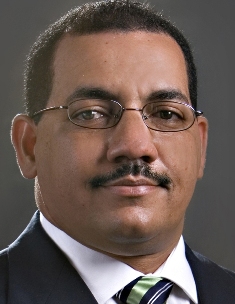
Youth unemployment at 38%
 (CNS): While the country’s overall unemployment rate is currently estimated to be around 6%, for young people aged between 18 and 24 the rate is now at 38%, the minister with responsibility for labour said this morning. Speaking at the opening of the Chamber’s Careers Expo, Rolston Anglin said that these were challenging times for everyone but particularly so for Cayman’s young people. As a result, he said, the first new initiatives in the ministry would focus on youth unemployment and helping young people gain the soft skills which he said were deeply lacking but were essential to securing a job.
(CNS): While the country’s overall unemployment rate is currently estimated to be around 6%, for young people aged between 18 and 24 the rate is now at 38%, the minister with responsibility for labour said this morning. Speaking at the opening of the Chamber’s Careers Expo, Rolston Anglin said that these were challenging times for everyone but particularly so for Cayman’s young people. As a result, he said, the first new initiatives in the ministry would focus on youth unemployment and helping young people gain the soft skills which he said were deeply lacking but were essential to securing a job.
“It is not surprising during a recession that we would see a spike in youngsters being unemployed and we recognise that this is the time to focus on young people,” Anglin, the Minister for Education, Labour and Training, said as he explained that the ministry would be rolling out the first phase of the ‘National Employment Passport’ initiative, which would be focusing heavily on youth training.
He noted that Cayman’s unemployment rate among young people was similar to that in the CARICOM region. Anglin also acknowledged that during times of severe unemployment, governments everywhere had a tendency to come up with plans and programmes in an attempt to keep people in work. However, he said that tackling unemployment was not about systems and programmes but about employability. Engaging in feel-good initiatives that leave people no more employable at the end than at the beginning are pointless, he observed, and said he was keen to ensure that the young people in Cayman gained the skills they needed to make them employable through proper training.
Speaking in broader terms about dealing with the employment challenges facing the jurisdiction, the minister said that the Labour Department had to integrate its information with the business community. He spoke of a real need for his ministry to understand the needs of the labour market and that without a more integrated system between the needs of the private sector and government programmes we would not solve Cayman’s employment challenges.
Given the economic situation, it was not the best time to be in government, Anglin told the audience at the short opening ceremony, and it certainly was not the best time to be the minister responsible for labour, but, he added, it was the responsibility he had asked for and wanted because he believed the challenges could be met. He emphasised the need to keep employment and education together in the same ministry as the training needs of the workforce had to be integrated with the recruitment needs of the business community.
“Until we have a truly integrated system that works for both our citizens and business we won’t be successful,” he said, adding that the system needed to be transparent to the business community. Anglin explained the private sector needed to know who was available for work and the DER needed to know what skills employers wanted. “As we execute the reforms to the DER we need to know what business wants,” he said.
The Chamber of Commerce Careers, Education, Training & Jobs Expo opened at the Family Life Centre in George Town on Friday morning and will be open until Saturday evening. Around a dozen employers, as well as a number of government departments, industry associations and both the UCCI and the ICCI were promoting their industries, training and scholarships along with career opportunities. Although the expo is open to anyone interested in finding work or changing careers, students from Grand Cayman who will be leaving school this year were given the first opportunity to meet with exhibitors this morning as the expo opened its doors at 10:00 am.

Local author to lecture on race at Books and Books
 (CNS): Local author Guy P. Harrison says races do not exist. He will explain why in a lecture at Books and Books, Camana Bay, scheduled for 7pm this evening, Friday 19 March. Harrison will discuss some of the key findings contained in his new book, Race and Reality: What Everyone Should Know about Our Biological Diversity (published by Prometheus Books, New York). The lecture is free and open to the public. “The news that biological race categories are illogical and imaginary is important and more people need to hear it,” said Harrison. “Races are cultural creations. Nature did not impose them upon us—we made them up. Anthropologists have been saying this for many decades now but the public has not yet absorbed it.
(CNS): Local author Guy P. Harrison says races do not exist. He will explain why in a lecture at Books and Books, Camana Bay, scheduled for 7pm this evening, Friday 19 March. Harrison will discuss some of the key findings contained in his new book, Race and Reality: What Everyone Should Know about Our Biological Diversity (published by Prometheus Books, New York). The lecture is free and open to the public. “The news that biological race categories are illogical and imaginary is important and more people need to hear it,” said Harrison. “Races are cultural creations. Nature did not impose them upon us—we made them up. Anthropologists have been saying this for many decades now but the public has not yet absorbed it.
"There is diversity in our species, of course, but the specific racial categories that most people believe in are fiction. Considering all the problems that come with racism, it’s vital that people learn the truth. Race belief is a very dangerous delusion.”
Harrison’s book covers several topics related to race, including: intelligence, healthcare, sports, love and sex, prehistoric migrations, European domination of New World peoples, and racism. Although it addresses a complex scientific subject, the book was written to be accessible to laypersons.
Race and Reality already has been selected as assigned reading in a sociology class at a New York college. It also has earned several strong endorsements from the United States academic community. “This is a very important, profound, enjoyable and enlightening book,” says Dr Robert W. Sussman, a Washington University anthropologists and Editor Emeritus of American Anthropologist. “It should go a long way in helping disprove man’s most dangerous myth.”
“We desperately need a book that sets us no-nonsense straight, and Race and Reality is just that book, a tour de force that conveys the current science on racial classification in a rigorous yet readable way,” says Dr. David B. Grusky, Professor of Sociology at Stanford University. “This is a book so clearly written, so elegantly crafted, so packed with nuggets that even those who think they know it all about race and racial classification will come away changed.”
“Harrison is a great teacher,” adds Dr Cameron M. Smith, a Portland State University anthropologist. “Drawing on a wide variety of evidence—the hard data from fossils and DNA, interviews with the victims of racism, and personal experiences—Harrison dismantles the race concept, bolt by bolt. Exposing race as a social illusion and political tool, rather than a biological reality, Harrison forces the reader to consider how they think about ‘other folk’.”
Race and Reality is Harrison’s second book. His first, 50 Reasons People Give for Believing in a God, achieved a number-one ranking in its category on Amazon in the United States, France, Canada, Germany and Japan.
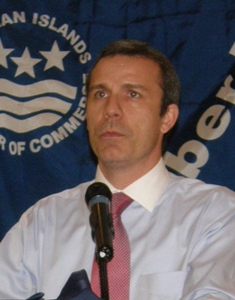
Chamber to examine the state of business
 (CNS): Businesses across Grand Cayman will be receiving a Chamber of Commerce survey today, Friday 19 March which it hopes will offer its members an opportunity to reveal the current issues of concern to the country’s private sector. The Chamber said it had dispatched around 700 24 question surveys, electronically, asking business owners to provide information that can be used at a forthcoming business forum. Focusing on a range of topics the survey seeks to gather opinions regarding the major constraints to business growth, plans for hiring or firing, the quality of the civil service and what people currently see as the main driving forces behind the economy.
(CNS): Businesses across Grand Cayman will be receiving a Chamber of Commerce survey today, Friday 19 March which it hopes will offer its members an opportunity to reveal the current issues of concern to the country’s private sector. The Chamber said it had dispatched around 700 24 question surveys, electronically, asking business owners to provide information that can be used at a forthcoming business forum. Focusing on a range of topics the survey seeks to gather opinions regarding the major constraints to business growth, plans for hiring or firing, the quality of the civil service and what people currently see as the main driving forces behind the economy.
The feedback from the survey will help to inform the first Future of Cayman Forum which the Chamber said it will be hosting later this year.
“The information gathered will help us better understand the “on the ground” challenges of our membership,” said Wil Pineau, Chief Executive Officer. “let’s name the problems we’re facing and look at how we can apply the four ‘I’s Innovation, investment , Integration and involvement in developing solutions.” Although Cayman has much to be thankful for the CEO said “success is no long a default setting for the economy.”
Encouraging all members to take a few minutes to fill out the survey Pineau said he hope they would register their thoughts and concerns about the current state of business.
“It doesn’t matter how big or small your business – everybody’s opinions are valuable and absolutely vital as we look at the way forward,” he added.
The survey is the Chamber said confidential, it can be completed quickly on line and as an incentive member businesses that complete the survey will be entered into a prize-draw.
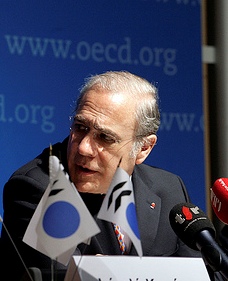
Cayman listed in first group of OECD peer reviews
 (CNS): The issue of cross-border tax evasion has entered another new phase with the launch by countries participating in the Global Forum on Transparency and Exchange of Information of a peer review process covering a first group of jurisdictions, the OECD has announced. The Cayman Islands is included in this group, along with 14 other countries. The global economic watchdog said that the reviews are the first step in a three-year process approved in February by the Global Forum in response to the call by G20 leaders at their Pittsburgh Summit in September 2009 for improved tax transparency and exchange of information.
(CNS): The issue of cross-border tax evasion has entered another new phase with the launch by countries participating in the Global Forum on Transparency and Exchange of Information of a peer review process covering a first group of jurisdictions, the OECD has announced. The Cayman Islands is included in this group, along with 14 other countries. The global economic watchdog said that the reviews are the first step in a three-year process approved in February by the Global Forum in response to the call by G20 leaders at their Pittsburgh Summit in September 2009 for improved tax transparency and exchange of information.
The OECD said on Thursday that reviews are a first step in a three-year process approved in February by the Global Forum in response to the call by G20 leaders at their Pittsburgh Summit in September 2009 for improved tax transparency and exchange of information.
OECD Secretary-General Angel Gurría said he welcomed this new step forward for the international tax compliance agenda.
"The Global Forum has beenquick to respond to the G20 call for a robust peer review mechanism aimed at ensuring rapid implementation of the OECD standard on information exchange,” he stated. “This is the most comprehensive peer review process in the world, and it is based on decades of experience at the OECD of conducting reviews of this kind in many other areas of policy making. I look forward to seeing the first results later this year".
The Global Forum brings together 91 countries and territories, including both OECD and non-OECD countries. At a meeting in Mexico in September 2009, participants agreed that all members as well as identified non members will undergo reviews on their implementation of the standard. These reviews will be carried out in two phases: assessment of the legislative and regulatory framework (phase 1) and assessment of the effective implementation in practice (phase 2).
The review reports will be published once they have been adopted by the Global Forum, whose next meeting will take place in Singapore at the end of September 2010.
Mike Rawstron, chair of the Global Forum, stated, “This is the most comprehensive, in-depth review on international tax co-operation ever. There has been a lot of progress over the past 18 months, but with these reviewswe are putting international tax co-operation under a magnifying glass. The peer review process will identify jurisdictions that are not implementing the standards. These will be provided with guidance on the changes required and a deadline to report back on the improvements they have made”.
The jurisdictions in the first review include Australia, Barbados, Bermuda, Botswana, Cayman Islands, India, Ireland, Jamaica, Jersey, Mauritius, Monaco, Norway, Panama, Qatar, Trinidad and Tobago.
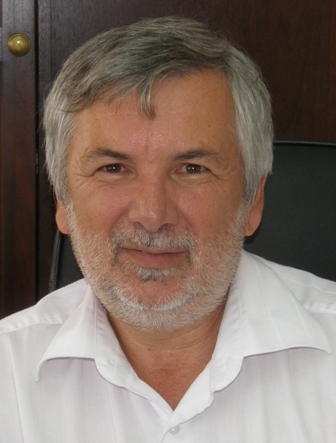
Duguay hopeful for report
 (CNS): After several years of pushing the need for more accountability and transparency in government finances, Auditor General Dan Duguay said he was hopeful that the findings of the Miller report would deliver home that message. Duguay said that many of the criticisms of public financial accountability noted by the Miller Commission were ones his office had consistently raised in the past in the hope of making government understand the need for responsible financial management. Backing Miller’s findings, the auditor general said government needs to be not just more accountable for what it spends but more open about how and why it is spending public funds, which requires accurate and transparent accounts.
(CNS): After several years of pushing the need for more accountability and transparency in government finances, Auditor General Dan Duguay said he was hopeful that the findings of the Miller report would deliver home that message. Duguay said that many of the criticisms of public financial accountability noted by the Miller Commission were ones his office had consistently raised in the past in the hope of making government understand the need for responsible financial management. Backing Miller’s findings, the auditor general said government needs to be not just more accountable for what it spends but more open about how and why it is spending public funds, which requires accurate and transparent accounts.
“We have been making the call for a number of years about the need for financial transparency and accountability,” Duguay said. “We support a number of the findings in the report and we really hope it has an effect.”
Duguay explained that improving financial accountability did not have to cost government more money, and in the end it would help it save and improve the management of the public purse. The senior government auditor said he was pleased that Miller had acknowledged the importance of bringing the accounts up to date and making government spending more public. He also noted that his office was finalising the latest report on the state of government financial reporting and told CNS that it would be given to the LA some time next month.
“We have been looking at how much improvement there has been since the last report and it is fair to see we have seen some improvement with some government departments and companies, but there are still some questions,” the auditor general said.
In his report James Miller seemed shocked by the situation regarding government’s failure to complete its annual accounts and the comments made by the auditor general in "The State of Financial Accountability Reporting", issued in April 2008.
“In view of the importance of independent audit and the need for Cayman, as a leading international financial centre, to conduct its affairs to the highest standards, we were somewhat surprised by what we found,” Miller wrote. Noting what Duguay had said about the $1.5 billion of operating expenditures that should have been accounted for that has not yet been reported to the Legislative Assembly and its loss of control of the public purse, he said it was a very serious matter.
“We are concerned from these comments that some parts of government, some of its statutory authorities and state owned enterprises are being managed by people who do not have full knowledge and control of their business unit‘s operations and who thus are not acting in a responsible and accountable manner,” Miller observed. He said that prompt, timely accounting and reporting was an immutable part of maintaining discipline over business activities.
“Besides possible risks to public safety, unintentional error (mistake) or intentional error (fraud and corruption) can result from such control weaknesses,” Miller said.
He also pointed out that the findings of the AG had rightly been included in the recent bond document, which he said may have affected the interest rate Cayman was able to secure.
“The fact that such statements had to be included in the recent Offering Memorandum is unfortunate but obviously necessary and correct. It would be surprising if their inclusion had not resulted in the Government’s paying a higher rate of interest on the borrowing than might otherwise have been the case,” the report stated. “These statements are fully public and must be regarded as potentially beneficial to competitor financial centres. Weaknesses in financial controls also have the potential to cause problems with maintaining the Cayman Islands reputation as an honest place to do business.”
The report noted that maintaining control over government and business activities was fundamental and of basic importance. Miller tied the lack of financial accountability to the wider problems of the budget and he said the research conducted by the authors of the report found evidence that the relevant committees of the Legislative Assembly are not fully informed of the budgetary implications of their decision making.
“Moreover, we find a significant lack of responsibility and accountability for spending decisions taken by the various Ministries,” Miller wrote, adding that government’s budget process lacks transparency, accountability, and control. “The current system does not enable timely control over spending, especially if committed programs overrun, leading to spending above amounts initially budgeted,” the report noted.
Miller concluded that the Cayman Islands Government had to improve accountability and the budget process before it could hope to better manageits financial affairs.

Police find ganja in school
 (CNS): The Royal Cayman Islands Police Service has confirmed that a very small unspecified quantity of ganja was recovered from Cayman Prep High School in George Town today by canine handlers. Police said that at around 8:35 am they received a report from members of staff that they had smelt ganja on school property. As a result the K-9 unit went to the school and searched the premises. Although a very small amount of the drug was discovered during the operation, police said that contrary to other reports, no students were arrested or detained. An RCIPS spokesperson told CNS this evening that the police were continuing their enquiries.
(CNS): The Royal Cayman Islands Police Service has confirmed that a very small unspecified quantity of ganja was recovered from Cayman Prep High School in George Town today by canine handlers. Police said that at around 8:35 am they received a report from members of staff that they had smelt ganja on school property. As a result the K-9 unit went to the school and searched the premises. Although a very small amount of the drug was discovered during the operation, police said that contrary to other reports, no students were arrested or detained. An RCIPS spokesperson told CNS this evening that the police were continuing their enquiries.